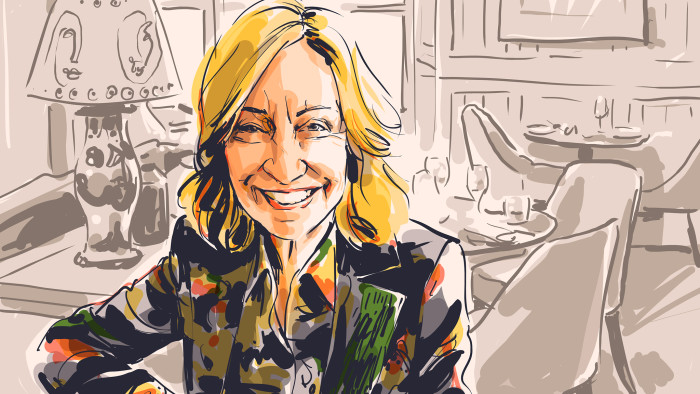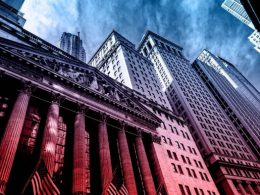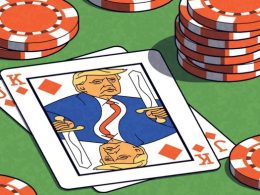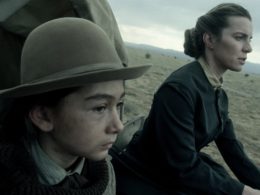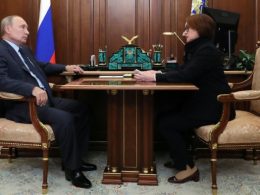Doris Kearns Goodwin is already seated in the foyer, bantering with a well-wisher, when I arrive a few minutes early. The grande dame of American history — author of Team of Rivals on Abraham Lincoln, and other bestsellers about historic US leaders, notably the Roosevelts and Lyndon Johnson, for whom Goodwin worked as a young woman — has chosen her Boston club for lunch.
Located in the town’s Back Bay neighbourhood, The Quin House has no dress code, which is a relief since I have forgotten to bring a tie. Though she turned 82 the week before we meet, Goodwin gives me a whirlwind tour. The club’s style is eclectic (a piece of flashy modern art here, a gilt-framed portrait of a lugubrious bygone notable there) and its membership skews young. “Isn’t it fun?” she asks of the whimsical decor. Every Tuesday, Goodwin dines here with five women friends, including Jill Abramson, who was the New York Times’s first female executive editor.
We are meeting the day after Jimmy Carter’s funeral in Washington’s national cathedral and 10 days before Donald Trump’s second inauguration. There is no better moment to tap the brains of America’s beloved presidential historian. Dressed in a colourful jacket and blouse, the diminutive Goodwin turns heads as we cross the dining-room floor. Keith, our waiter, who has a thick Boston accent, greets her like royalty. “I’ll have a glass of Sancerre,” Goodwin says after he has laid out a choice of soft drinks. I duplicate her order.
I bumped into Goodwin last summer at a conference in Big Sky, Montana, high up in the Rockies. Over dinner, Goodwin regaled attendees with anecdotes about America’s presidents. The cavernous hotel’s eerily silent corridors had reminded me of the movie The Shining. In the film’s scariest scene, the child Danny rounds the corridor on a tricycle to find the ghosts of two murdered girls. I remind Goodwin that when we were in Big Sky, the hotel’s ear-splitting alarm went off at 4am. Having not spotted a soul on the dimly lit route to the exit signs, I nearly hugged the dressing-gown-clad Goodwin when I ran into her on the same journey. We joined the bleary-eyed throng of guests outside the front entrance. It was a false alarm. “Yes, I can’t forget that,” she laughs.
Could she think of a parallel to this moment in US history, I ask. “The scary one is the 1850s,” Goodwin replies. She recaps the infamous 1856 assault on Charles Sumner, a leading abolitionist, by Preston Brooks, a pro-slavery congressman who beat him with a cane on the Senate floor. “Sumner becomes a hero in the north. The outrage helps to mobilise moderates. Meanwhile, Brooks becomes a hero in the south as someone who did a great deed. People started sporting canes. That makes me think of January 6.”
Is she saying that the US faces an equivalent spectre today? Comparing America’s wildly diverging takes on the January 2021 Capitol Hill assault to the bifurcated nation on the eve of the US civil war sounds ominous, I say. “It’s weird to find solace in the civil war, or the Great Depression, or the beginning of world war two, but my whole optimistic temperament depends on saying that we will get through it and emerge stronger,” Goodwin replies. “We paid a terrible price for the civil war but we took away slavery, our original sin.”
Having deposited our wine, Keith wants to know our choice of starters. Goodwin picks the butternut bisque — “I love my soup very hot,” she adds. Again, I follow her. Our bowls arrive but the soup is not hot enough. Goodwin summons Keith. “Make it so hot that you will need gloves to bring it back,” she says. Me too, I say.
Goodwin is the type who lights candles rather than curses the darkness. With the exception of her latest book, An Unfinished Love Story, an elegy to her late husband Richard Goodwin, who worked for both John F Kennedy and Johnson, her oeuvre comprises grand histories of protean figures who help America overcome steep odds. There is a cinematic quality to Goodwin’s work. She often collaborates with the documentary-maker Ken Burns, or Steven Spielberg. Her current project is a history of the American west narrated by the actor Kevin Costner.
Trump’s return does not fit easily into Goodwin’s America. I suggest that an era that does echo today is when the Carnegies, Rockefellers and Vanderbilts — the Elon Musks, Mark Zuckerbergs and Jeff Bezoses of their age — were redefining what it meant to be wealthy. Goodwin likes that comparison. “The robber barons probably looked in the mirror and thought they were God too,” she says.
The late 19th century was a time of dizzying technological upheaval, canyon-wide gaps between rich and poor, and resentment by small-town America of the increasingly “sinful” immigrant-teeming cities, she says. Then along comes Teddy Roosevelt, one of Goodwin’s heroes (she calls them “my guys”). Roosevelt ushers in the progressive era, busts the trusts, offers a square deal to every American and uses government to tame the vast power of the private combines. “An English guy said that he had seen two forces of nature in America — the Niagara Falls and Teddy Roosevelt,” Goodwin says.
Who is today’s Roosevelt, I ask. “History doesn’t produce these characters easily,” she says after reflecting. “He knew how to use the bully pulpit.” Then, “Teddy would have been great on Twitter.” So would Mark Twain and Winston Churchill, I say. But they may have frittered their lives away. “Lincoln always said don’t speak extemporaneously — think before you speak,” Goodwin says. “But he could be so quick in debate. When someone accused him of being two-faced, he said ‘If I had two faces, would I be wearing this one?’”
I confess to Goodwin that the surreal quality to recent US politics has turned me away from history to science fiction. Trump’s orbit has become a battleground over which of the titans will dominate AI — the technology that will supposedly upend our world. Musk also wants to settle Mars. “I prefer John Grisham, or a mystery novel,” Goodwin says. But she concedes that the leader who masters his day’s medium wins. Lincoln’s speeches were printed by the newspapers and turned into pamphlets. Franklin D Roosevelt broadcast his fireside chats on the radio.
“Saul Bellow [the great Chicago novelist] said you could walk the streets and see people glued to their radios and not miss a word of what FDR said,” she tells me. Eight out of 10 Americans listened to him — “the others probably threw their radios out of the window,” Goodwin says. Kennedy and Ronald Reagan knew the power of television. “Then along comes social media and Trump has mastered that.”
We have finished our soups, which Keith accurately described as “piping hot”. He wants our next order. After debate, Goodwin picks the poached salmon but with truffle fries instead of broccoli. “With mayonnaise please, not ketchup,” she says. Apologising for my lack of originality, I pick the same entrée. “No, but you’re having the broccoli so it’s not the same,” says Goodwin.
She asks as many questions of me as I do of her. Her curiosity is genuine. But it is clear that she does not want to speculate about what Trump will do. “I am not good at futurology,” she says.
Can she imagine a new progressive era in an age where reading is an increasingly minority pursuit? Goodwin replies that her late husband Dick would write to friends from southern France, where he was based while serving with the US army in the 1950s. His favourite hour was when he smoked a cigar while reading in the local library.
In the last week of his life, in 2018, he received hospice care at the couple’s home in Concord, Massachusetts. Their house had about 10,000 books. His final week was a prolonged “Irish wake” in the downstairs library, with friends coming and going. He was no longer permitted to smoke but he kept an unlit cigar in his mouth. Until his dying breath, he was still working on their book. “Dick’s last words to me were, ‘You are a wonder,’” Goodwin says.
How did you fall in love with reading, I ask. Goodwin tells me that her mother, who suffered from a heart defect and was housebound, would read all the time and kept sending her to the library. Goodwin grew up in Long Island, the youngest of three daughters. The other two became nurses. Both of her parents left school at 16. Goodwin also had an inspirational female history teacher. “You felt as if you were living with the characters,” she says. “When she told us the story of Lincoln’s death, she cried.”
Menu
The Quin House
217 Commonwealth Avenue, Boston, MA 02116
Butternut bisque x2 $30
Salmon entrée x2 $60
Pommes frites $7
Glass of Sancerre x2 $40
Double espresso $6.50
Americano $5.50
Flavour shot $0.50
Club fee $26.91
Kitchen appreciation fee $2.19
Total (inc tax and service) $229.06
After they moved to Brooklyn, Goodwin became a fan of the Brooklyn Dodgers, who, like her current team, the Boston Red Sox, are heroic losers. The title of her memoir, Wait Till Next Year, was a Dodgers refrain. “If I had been a Yankees fan I would have been happy my whole life,” she says. A couple of years ago Goodwin was taken to a Liverpool football match at Anfield. She was blown away by the singing and spirit of belonging. “They were more emotional than even the baseball crowds. People have a yearning for that collective identity.”
Where else could people look, I ask. Goodwin says that Trump has a chance with his second inauguration to atone for his first. Last time he spoke of “American carnage”. This time he could forget old enmities and bring the country together. I express doubt that Trump will do this. “Lincoln used to say that democracy was a system that allowed you to arrive at your level of talent and discipline,” Goodwin replies. “A lot of people don’t feel that any more. This is where class comes in. People feel they will never have that camaraderie they had when their father was in the union. Trump spoke to that. You wonder how much talent is out there and the system doesn’t let them rise.”
What would she recommend Trump do? Goodwin talks of the need for national service to break down barriers between Americans — throwing together people from different classes, races and regions via the military draft or a civilian service. “We used to have study hall, when we would read,” she says. “They could have that too.” Trump could make such a project his legacy, she says. “Kennedy said that problems created by man can be solved by man. Unless we break down the sociological and psychological antipathy between Americans, then the only way we could change that is we have some huge foreign problem . . . If I were not writing, that is what I would be working on.”
Keith is back for our next order. Mine is a double espresso with hot milk on the side. Goodwin only wants hot water. Partly from pride, I urge her to match me this time. She does not drink coffee. “Howard Schultz [the former Starbucks chief executive] told me he never takes caffeine after 3pm,” she says. It is 3.15pm: we have been chatting for more than two hours. With the help of Keith, I persuade her to take an Americano with vanilla syrup. “This is huge,” Goodwin says, after agreeing to the order. When the coffee arrives, she takes a heroic sip. “Wow, I love this.”
What is her next writing project, I ask. Has she considered Andrew Jackson, the US president to whom Trump is most often likened? Jackson, in office from 1829-37, expropriated Cherokee land and tormented New York’s intellectual elites. Goodwin looks doubtful. “I choose subjects because I want to wake up with them and go to bed with them,” she replies. “There is something about living in the 1850s and 1860s that, crazy as it sounds, makes you feel you are on the edge of something important.” Researching America’s founding fathers does not appeal to her, either. “I’m not sure why that is, though I have recently grown to love George Washington,” she says.
It seems that Lincoln is your favourite guy, I suggest. Goodwin’s face lights up. When she embarked on Team of Rivals, she consulted the Harvard historian David Donald. “He told me, ‘You will feel better after having lived with Lincoln. People do.’ She also felt good when Barack Obama, who loved the book, called her during the 2008 campaign. “He wanted to know where Lincoln found the emotional intelligence to forgive his enemies and appoint them to his cabinet.” At a party on Obama’s inauguration night, Goodwin recalls, Hillary Clinton joked to her, “I have you to thank for being secretary of state.”
Then Spielberg turned her book into a movie, with Daniel Day-Lewis playing Lincoln. “I ended up falling in love with Daniel. I love Lincoln and I love him.” Her crush was helped by the fact that Lewis remained in character off set and on. She took the actor to Lincoln’s hometown of Springfield, Illinois, and they went out drinking. When she went to Spielberg’s home to watch the first cut of the movie, the director was pacing up and down nervously. “No matter what success you’ve had, it’s always the next thing, right?” Goodwin says. They agreed that the Anglo-Irish actor was Lincoln and Lincoln was him.
It seems that the naturally caffeinated Goodwin would happily converse for another two hours. Alas, I have a flight back to DC. What you need is to find your next project, I suggest. “I know — I’m still looking,” she replies. She points out that she is on the road a lot, giving speeches about leadership. “Travel is the most wonderful thing,” she says. She has just spent a week in London with one of her sons, his wife and their two sons. “There is something so magical about London at Christmas,” Goodwin says. “We went to pubs and plays and Hamleys [the toy shop]. It felt like we were there a month.”
After settling the bill, I ask Goodwin for her distillation of what makes a good leader — the topic on which she is most frequently asked to speak. “It is a constellation of traits,” she replies. “It’s EQ and humility — acknowledging that you don’t know things and that you’ll make mistakes. It is sharing credit, having an ambition larger than yourself, compassion.” I resist asking whether Trump possesses any of those qualities. Goodwin’s optimism is so irrepressible that I feel it would be in poor taste. “I hope we meet again,” she says as we shake hands. Not for the first time, I am happy to echo her order.
Edward Luce is the FT’s US national editor
Find out about our latest stories first — follow FT Weekend on Instagram and X, and sign up to receive the FT Weekend newsletter every Saturday morning





